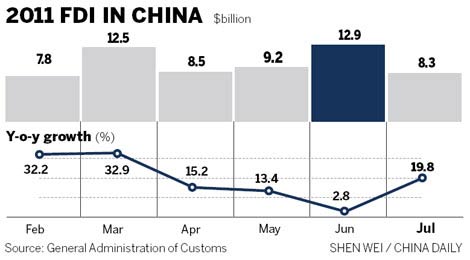Economy
FDI flows to China still strong
Updated: 2011-08-19 13:58
By Lu Chang (China Daily)
Nation remains top draw for investment even as gloom spreads in US, Europe
|
|
Foreign direct investment (FDI) in China continues to be on a strong perch with double-digit growth rates during the first seven months of the year, even though there has been a marginal slowdown in investments from the European Union (EU).
Experts, however, say that the slowdown in European investments is only a short-term blip on the FDI radar and will soon gather momentum.
Investment from the European Union in China between January and July recorded a year-on-year growth rate of just 1.36 percent to $4.08 billion (2.84 billion euros). During the same period 976 EU companies set up bases in China, a year-on-year increase of 7.14 percent.
US investments in China also fell by nearly 19.17 percent year-on-year to $1.94 billion in the first seven months as the debt crisis continued to extract a heavy toll on the US economy. In contrast, investment flows from the Asia-Pacific region, including Japan, Malaysia and Singapore, saw an increase of 23.67 percent to $59.54 billion.
Total FDI jumped 18.6 percent year-on-year in the first seven months to $69.2 billion. Foreign investors set up about 15,600 new companies during the period, up 7.89 percent.
According to Commerce Ministry spokesman Yao Jian, the slowdown or decline in EU and US investments in China has more to do with the overall global environment.
He pointed out since EU member countries had reduced investment in foreign countries by 62 percent in 2010, it was only normal for them slow down investments in China considering the overall situation in Europe.
Peter Pak, executive director of BOCI Research Ltd, an investment research firm, says investments to China have fallen due to the debt crisis and poor economic growth in the US.
"The data clearly indicates that China is still one of the most attractive countries for investment," says Pak. "I actually think the financial crisis has helped China to gain more FDI from other places. The expectations of the yuan appreciating is another positive trigger for FDI.
"On the other hand, liquidity in both the US and Europe remains weak amidst persistent debt troubles. I believe the situation will last for quite sometime, particularly for nations within the eurozone."
But other economists believe that the slowdown in EU investment is only a temporary phenomenon.
|
 |
Lang Qi, a researcher from a Shanghai-based security company, says uncertainties in the global economy and the bleak outlook have held back investment from developed nations, but "China's attractiveness is still there" and "there is no sign of a sharp drop coming".
A recent survey of its member companies released by the European Union Chamber of Commerce in China (EUCCC) and Roland Berger Strategy Consultants shows that more than half of the European companies were optimistic about future growth within their sector in China.
But EUCCC cited "the investment concerns of European enterprise related more to unfair competition and lack of a fair business environment".
European Chamber President Davide Cucino had in a press conference in Beijing indicated that a good business environment would help ensure that European enterprises would continue to make contributions to the Chinese market.
"We do not ask for preferential treatment but for equal treatment and an open market. The concern of European enterprises relates to unfair competition and the rigid supervisory environment. It also makes us doubt the Chinese commitment of offering a fair chance in the market and the attractiveness of the business environment," says Cucino.
But the survey also pointed out that 78 percent of the nearly 300 respondents recorded profits in 2010, with 59 percent of them planning new investments, up from 48 percent in the previous survey.
Fiat Group Automobiles, one of the automotive companies of leading Italian carmaker and CBI member Fiat Group, plans to expand its dealership network in China by around 60 dealers by September 2012, raising the number from the current 40 to approximately 100 dealers.
BMW Automobiles saw strong sales growth in the second quarter of 2011 with a total of 122,034 units being sold in China, accounting for 14.5 percent of its total sales volume.
FDI for July surged 19.83 percent year-on-year to $8.297 billion, compared with the weak growth of 2.83 percent in June, according to data from the ministry of commerce.
But the fluctuation does not necessarily mean multinationals are losing confidence and holding back on investing in the Chinese market.
The yearly World Investment Report released on Aug 16 by the United Nations Conference on Trade and Development said that China will remain the most attractive investment destination in the next two years.
According to the report, China absorbed the second-largest volume of FDI in 2010, following the United States, and for the 19th consecutive year was the largest developing economy in terms of FDI and the second largest worldwide.

Specials

Biden Visits China
US Vice-President Joe Biden visits China August 17-22.

Star journalist leaves legacy
Li Xing, China Daily's assistant editor-in-chief and veteran columnist, died of a cerebral hemorrhage on Aug 7 in Washington DC, US.

Robots seen as employer-friendly
Robots are not new to industrial manufacturing. They have been in use since the 1960s.
